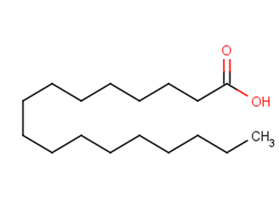
Heptadecanoic acid
CAS No. 506-12-7
Heptadecanoic acid( —— )
Catalog No. M19611 CAS No. 506-12-7
Heptadecanoic acid is a fatty acid of exogenous (primarily ruminant) origin. Many "odd" length long chain amino acids are derived from the consumption of dairy fats (milk and meat).
Purity : >98% (HPLC)
 COA
COA
 Datasheet
Datasheet
 HNMR
HNMR
 HPLC
HPLC
 MSDS
MSDS
 Handing Instructions
Handing Instructions
| Size | Price / USD | Stock | Quantity |
| 100MG | 35 | In Stock |


|
| 500MG | 82 | In Stock |


|
| 1G | 120 | In Stock |


|
Biological Information
-
Product NameHeptadecanoic acid
-
NoteResearch use only, not for human use.
-
Brief DescriptionHeptadecanoic acid is a fatty acid of exogenous (primarily ruminant) origin. Many "odd" length long chain amino acids are derived from the consumption of dairy fats (milk and meat).
-
DescriptionHeptadecanoic acid is a fatty acid of exogenous (primarily ruminant) origin. Many "odd" length long chain amino acids are derived from the consumption of dairy fats (milk and meat). Heptadecanoic acid constitutes 0.61% of milk fat and 0.83% of ruminant meat fat. The content of heptadecanoic acid in the subcutaneous adipose tissue of humans appears to be a good biological marker of long-term milk fat intake in free-living individuals in populations with high consumption of dairy products.
-
In Vitro——
-
In Vivo——
-
Synonyms——
-
PathwayOthers
-
TargetOther Targets
-
RecptorOthers
-
Research Area——
-
Indication——
Chemical Information
-
CAS Number506-12-7
-
Formula Weight270.45
-
Molecular FormulaC17H34O2
-
Purity>98% (HPLC)
-
SolubilityDMSO: 10mg/mL;Water: Insoluble
-
SMILESCCCCCCCCCCCCCCCCC(O)=O
-
Chemical Name——
Shipping & Storage Information
-
Storage(-20℃)
-
ShippingWith Ice Pack
-
Stability≥ 2 years
Reference
1.Wolk A et al. Evaluation of a biological marker of dairy fat intake. Am J Clin Nutr. 1998 Aug;68(2):291-5.
molnova catalog



related products
-
Ginsenoside F4
Ginsenoside F4 has inhibitory effect on human lymphocytoma JK cell by inducing its apoptosis, the mechanism is related to the mitochondrial dysfunction and the increase of Bax expression and decrease of Bcl-2 expression.
-
Nicotredole
Nicotredole (Tryptamide) is an orally active anti-inflammatory and analgesic agent. Nicotredole exhibits evident antiinflammatory effects of potency comparable with Phenylbutazone. Nicotredole has only weak ulcerogenic activity.
-
Indole-3-methanamine
Indole-3-methanamine has been detected, but not quantified in, barley, cereals, and cereal products.



 Cart
Cart
 sales@molnova.com
sales@molnova.com


